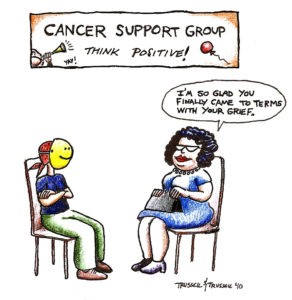
Diagnosed with Cancer? Your two greatest challenges are understanding cancer and understanding possible side effects from chemo and radiation. Knowledge is Power!
Learn about conventional, complementary, and integrative therapies.
Dealing with treatment side effects? Learn about evidence-based therapies to alleviate your symptoms.
Click the orange button to the right to learn more.
- You are here:
- Home »
- Blog »
- side effects ID and prevention »
- Anti-Inflammatories Improve Antidepressant Treatment
Anti-Inflammatories Improve Antidepressant Treatment

“Certain anti-inflammatory drugs improved antidepressant treatment effects and depression symptoms without increasing risk for adverse events…
The first article linked and excerpted below cites anti-inflammatory drugs as possible therapies to enhance antidepression treatments. But what about non-toxic anti-inflammatory therapies such as curcumin, nutrition, omega-3 fatty acids, and even…exercise to enhance mood and boost antidepressant treatments?
I’m not a certified psychiatrist. So I am way out of my field here. I am a long term cancer survivor who has manage to weather the ups and downs of livine with an incurable cancer called multiple myeloma. Not to mention living with the short, long-term and late stage side effects of toxic, conventional cancer therapies.
All I’m saying is that a diagnosis of an incurable cancer messes with your body and your mind. And I’m also saying that the evidence-based, non-toxic therapies below have helped me manage my body and brain health since 1994. So maybe they’ll help you too.
To learn more about anti-inflammatory therapies, scroll down, post a comment or a question and I will reply to you ASAP.
Thanks,
David Emerson
- Cancer Survivor
- Cancer Coach
- Director PeopleBeatingCancer
Recommended Reading:
- Chemobrain Coping- my list of 8 after 25 years-
- Fruit Smoothie with Protein and Chia/Flax Seeds
- Omega-3 Fatty Acids-Cancer, Heart, Brain, Blood
Anti-inflammatory agents improve antidepressant effects
“Certain anti-inflammatory drugs improved antidepressant treatment effects and depression symptoms without increasing risk for adverse events, according to findings from a systematic review and meta-analysis.
Evidence has shown that NSAIDs and cytokine inhibitors appear to have beneficial antidepressant treatment response, both as add-on therapy in patients with major depressive disorder and as monotherapy in patients with depressive symptoms..
“However, several of these studies only investigated specific agents, did not assess the risk for side-effects, only included patients with MDD while excluding patients with a somatic disease and depressive symptoms or failed to perform a thorough bias assessment,” they wrote.
Researchers conducted a systematic review to identify randomized clinical trials (RCTs) with anti-inflammatory drugs measuring antidepressant effects and adverse effects of pharmacological anti-inflammatory intervention in adults with MDD or depressive symptoms…
Meta-analysis revealed that anti-inflammatory agents outperformed placebo in improving depressive symptoms as an add-on treatment in patients with major depression…
The specific anti-inflammatory drugs that showed superior antidepressant treatment effects to placebo were:
- NSAIDs (SMD = –0.4; 95% CI, –0.62 to –0.18; I2= 82%);
- cytokine inhibitors (SMD = –0.56; 95% CI, –0.93 to –0.19; I2 = 95%);
- statins (SMD = –0.26; 95% CI, –0.48 to –0.04; I2 = 65%);
- glucocorticoids (SMD = –0.9; 95% CI, –1.44 to –0.36; I2 = 0%); and
- minocycline (SMD = –0.87; 95% CI, –1.45 to –0.29; I2 = 63%).
In the trials reporting on adverse effects, researchers found no increased risks for gastrointestinal symptoms, pain/muscle aching or cardiovascular events among patients on anti-inflammatory agents compared with those on placebo…
“This definitely bolsters our chances of being able to provide personalized treatment for individual patients in the longer term,” Köhler-Forsberg said in a press release. “Of course, we always have to weigh the effects against the potential side-effects of the anti-inflammatory drugs…”
Curcumin Shows Promise as Depression Treatment
“Chronic inflammation can decrease levels of serotonin and dopamine and lead to degeneration in certain brain areas. It is possible that the antioxidant and anti-inflammatory effects of curcumin can restore these neurotransmitters and protect the brain, eventually leading to improvements in mood…”
Natural Mood Foods: the actions of polyphenols against psychiatric and cognitive disorders
“Abundant in green tea, EGCG is a natural catechin polyphenol that has been utilized in China as medicine for at least 4000 years. Now available in botanical supplement form, EGCG is most renowned for its high antioxidant activity and its ability to alleviate symptoms of stress and depression. ”
Omega-3 Fatty Acids and Mood Disorders
“Deficits in omega-3 fatty acids have been identified as a contributing factor to mood disorders and offer a potential rational treatment approach.”
[Effects of exercise on anxiety, depression and mood].
“The meta-analyses of correlational and experimental studies reveal positive effects of exercise, in healthy people and in clinical populations (also in patients with emotional disorders) regardless of gender and age. The benefits are significant especially in subjects with an elevated level of anxiety and depression because of more room for possible change…”



